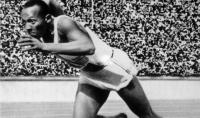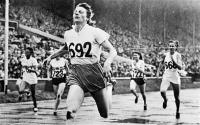
Harrison Dillard, U.S., won the 100-meter dash with a time of 10.3 seconds.

Robert Mathias, 17, won the Decathalon for the United States.

Fanny Blankers-Koen, “the Flying Housewife,” of Denmark won four Gold medals in track at the age of 30.
Editor’s note: As the 31st Games of the Olympiad approaches, August 5-21 in Rio de Janeiro, I thought it would be interesting to resurrect stories of former Olympics as written in Coconut Times in the summer of 1992, year of the Games in Barcelona, Spain.
After World War II ended, London took on the amazing task of staging the 1948 Olympics, the first in twelve years. Controversy was growing in England at this time, arguing that London was wasting money on the project because Britain was still recovering from the war. However, competitors progressed, and the games went off well with interest among Londoners raising quickly. Germany and Japan, the two World War II losers, were not invited to compete in the 1948 Olympics because of a precedent set after WWI. London also saw the first participation by communist countries, and with this, the first defection of participants.
The 1948 London Summer Olympics were held July 29 to August 14. There were 59 nations represented consisting of 3714 men and 385 women competitors. The number of participants has grown considerably since 1948, when recognizing that the 1988 Seoul, Korea Olympics hosted 6983 men and 2438 women and 159 nations were represented.
Not only has the number of competitors increased over the years, but the Olympics as a whole has become more elaborate. Originally, in 776 B.C., when the ancient Olympic Games were held in Olympia, there was only one race, a sprint, and the prize for the winner was an olive wreath. Other races were eventually added, and as time went on, prizes became greater in value.
The modern Olympic Games were proposed by Baron Pierre de Coubertin of France in 1892. After gaining support, the first modern Olympics were held in 1896 in Athens, since interest was the strongest in Greece. The first Olympic Games were a huge success, but as the Olympics went on, things like politics began to play a recognizable role.
Olympic athletes represent an almost complete economic cross section of the world’s population. From carpenters to cartoonists, soldiers to secretaries, almost all classes and occupations are accounted for. The Olympics are, and have always been, very political. From the very beginning, the Olympics were exploited by the ruling classes of the nations in which they were held.
Hosting or staging, the Olympics always helped ruling classes by providing a distraction from serious political and economic problems. Political statements made by participants have been very diverse in Olympic Games - statements such as German athletes in 1936 giving a Nazi salute. Since it was approved by the German government at that time, it was alright for German competitors to pledge their respect for their country in this way. Today, as well as in the past, U.S. athletes put their hands over hearts because it is a patriotic gesture that shows support for nationalism. The Olympics have always reflected the politics of the world, and it always will.
Amateurism is another subject that comes into play when discussing the Olympics. Amateurism developed in England as a means of preventing working classes from competing against aristocracy. The wealthy could train and take part in sports without having to worry about making a living, thus becoming an amateur. Working class people had to give up training to earn a living, or get paid for their sports performances and become a professional. Professional athletes are ineligible to compete in the Olympics. This is a restriction that seems silly today arguing that the best athletes in a certain sport should compete for their country. David Wallechinsky (current president of the International Society of Olympic Historians) is quoted saying: “I believe that the code of amateurism will eventually be discarded and the Olympics will be declared open to all qualified athletes.” Communist nations claim they have no professional athletes and are able to field the best possible teams in every sport. It is important that these unfair advantages provided for the rich and Communists are eliminated.
The United States led the 1948 London Summer Games winning 38 Gold medals, 27 Silver and 19 Bronze. In the track and field events, the 100-meter dash was won by Harrison Dillard, who equaled the all-time Olympic record with a time of 10.3 seconds. The 400-meter dash was won by Jamaican born Arthur Wint. In the final curve of the race, he closed the gap behind Herbert McKenley with 20 yards to go, and pulled ahead to win by two and a half yards.
Seventeen-year-old Robert Mathias from the United States won the 1948 decathlon, consisting of ten events over a two-day period.
Holland’s Fanny Blankers-Koen won four of the nine women’s track and field events in 1948. These were the 100- and 200-meter dashes, 100-meter hurdles, and the 4 x 100 relay. Fanny Koen was 18 years old when she was chosen to join the Dutch team for the 1936 Olympics in Berlin. By the 1948 Olympics, Fanny was the holder of six world records. At 30 years of age, married with two children, Fanny was thought by some to be too old to win the Olympic sprints. She quieted her critics immediately by recording the best time of the opening round in the 100-meter dash with an 11.99 second run. She went on to convince the weary spectators of her capabilities by winning three more Gold medals in the track and field events.
London hosted the second Olympic basketball event. The United States took the Gold with eight wins and zero losses. Women’s Olympic basketball was not held until 1976.
Gymnastics, a popular Olympic sport, is divided into three parts. The first two days involve compulsory exercises. Thirty-six gymnasts with the highest scores go on to the all-around finals. The top eight scorers on each apparatus move on to the apparatus, or all-around finals. In 1948, the men’s all-around finals were led by Viekko Huhtanen of Finland. Women’s all-around finals were not held until 1952.
The Swedish placed first in the soccer event with four wins and no losses. By 1948, the best players of Western Europe and South America were turning professional, and Olympic soccer began to be dominated by the state-sponsored amateur teams of Eastern Europe. Sweden was the last non-communist team to win an unboycotted Olympic soccer tournament.
Swimming is another favorite among Summer Games, and a strong point for United States competitors in 1948. The 100-meter freestyle was won by Walter Ris, United States, with a time of 47.3 seconds; and Greta Anderson of Denmark won this event for the women with a time of 1.06. Alan Stack of the United States finished first in the 100-meter backstroke men’s competition. The United States’ Karen Margrete Harrup won this event for the women. The United States team took the Gold for the 4 x 200-meter freestyle relay, a highlight of the relay events. All men’s and women’s diving events in 1948 were also won by the U.S.
Yachting brought a medal to Paul Elvistron from Denmark in the Finn event. The Finn uses a centerboard dinghy and a one-man crew. The star-mixed yachting event is a 23-foot long, shallow mono-type of American origin with a 281-square-foot sail and a two-person crew. This event was won by United States’ Hilary and Paul Smart. Paul Smart was a 56-year-old lawyer from New York. His 23-year-old son, Hilary, was a Harvard student.
The Equestrian has one three-day individual event that is the most rigorous of the equestrian competitions. The event consists of three parts: dressage, endurance, and show jumping. The endurance course is very dangerous. Only 35 of the 73 entrants completed the competition in 1948, and two horses were killed. This event was won in the Summer Olympics by Bernard Chevalier of France and his horse Aiglonne.
Field Hockey was won in 1948 by India. Ever since India first appeared on the field hockey scene, Great Britain avoided playing the team, afraid of losing to one of its colonies. However, in 1948, India gained independence from Britain and a chance to face its mentor in what was now an Indian national sport. The match for first was no contest, and Great Britain was shut out, 4-0.
In cycling, the road race brought José Beyaert a win and the 1000-meter sprint went to Italian Mario Chella.
Certain sports played in the Olympics today were not included as Olympic events in 1948. Volleyball, Archery, Badminton, are just a few examples. Baseball will be included as an Olympic event in the summer games of 1992; and in the yachting competition, women’s board-sailing will be a part of the summer games as well. Tennis was not held as an Olympic event between 1928 and 1984.
The Olympic Games of 1948 meant many things for Great Britain and many others. It was a time of rebuilding after the war, and it brought 59 nations together to compete as a whole. Unity and sportsmanship was the key to making the London Olympics a success. Political and economic views were put aside, and all competitors acted as professionals to continue a worldwide unification that every nation can call their own.


